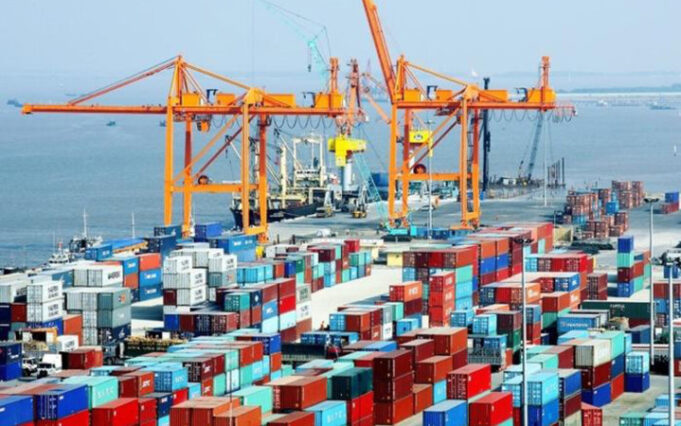The Nigerian Ports Authority (NPA) has introduced various measures to address the endemic vehicular gridlock in Apapa, its acting Managing Director, Mr. Mohammed Bello-Koko, has said.
Bello-Koko spoke outlined the measures in a TV breakfast show in Lagos, according to a statement issued by Mr. Olaseni Alakija, General Manager, Corporate and Strategic Communications.
He said the increasing deployment of the electronic call-up infrastructure for cargo trucks, popularly known as ‘Eto’, launched in February, had greatly resolved the Apapa vehicular gridlock.
“Five months after assuming office as the acting managing director, the incremental deployment of the electronic call-up infrastructure for cargo trucks, known as ‘Eto’, launched in February has, to a large extent, resolved the Apapa vehicular gridlock.
“The authority keeps reviewing and improving on the system.
“While the authority is not unmindful of the pains of Apapa residents, what remains is to address the gridlock caused by the failed portion, along the Mile 2 to Tin-Can Port road.
“As soon as the entire stretch of the Tin-Can Port highway is completed, the perennial gridlock within Apapa will be completely eliminated.
“After this, the NPA will fully deploy the ‘Eto’ call-up infrastructure, for trucks along the Tin-Can Port corridor,” he said.
Debunking insinuations that the ‘Eto’ system had been compromised, the NPA boss explained that a comprehensive review of the system had been done.
He added that the system manager had been directed to, as a matter of urgency, address all areas of deficiencies.
Bello-Koko noted that with the infrastructure upgrades, coupled with the support of the Lagos State Government and other stakeholders, the vehicular gridlock along the Ijora – Apapa axis, had reduced by over 80 per cent.
He further stated that the authority had fully embraced multimodal transportation by encouraging better use of barges and port-rail.
According to him, this has enhanced the movement of laden and empty containers in and out of the ports, a development that has brought significant reduction in the cost of doing business at the ports.
“As part of efforts to kick-off the electronic call up system, a fully automated transit truck park was established.
“Already, 29 satellite parks have been approved to ensure that trucks coming to do business in the port are properly profiled and verified.
“Out of the 29 parks, about eight have met the required standards, which include installation of bollards, CCTVs, automated gate systems and relevant information technology equipment,” he said.
He added that the e-call-up system had streamlined cargo evacuation and truck movements.
According to him, this is apart from few isolated cases, where some truck drivers tried to subvert the system by not adhering strictly to the truck manifest and arrangement, with its attendant disruption,
Bello-Koko added that the technology in place had brought a level of sanity to the roads.
He also attributed the elimination of the Apapa gridlock to the new policy introduced by the authority.
According to him, the policy compels shipping lines to ship out no less than 80 per cent of the number of containers shipped in, for every voyage, be it empty containers or export cargo.
“Over time, we discovered that most shipping lines were storing their empty containers in Nigeria, which was cheaper for them.
“But we have introduced a policy whereby shipping companies should take back 80 per cent of the laden containers they brought into the country from the stock of empties and export cargo.
“This has also reduced the number of trucks with empty containers waiting on the roads.
“What this means in a lay man’s language is that, if a vessel brings 100 containers, for instance, such vessel must take back 80 containers which must be among the empties and export containers, without which she will not be allowed to sail out of the ports,” he said.
The NPA boss declared that a total of 80,000 trucks had so far registered on the ‘Eto’ platform.
He noted, however, that only 16,000 of them had met the minimum safety standards, which was an indication that more work needed to be done to enthrone safety and prevent accidents within the port area.
Bello-Koko said that the authority had also embarked on ‘operation green’, through which all illegal structures and shanties on port access roads in Apapa were cleared.
According to him, the move formed part of efforts to ensure free flow of traffic in the area.
He stated that barge operators were now being guided by revised standard operating procedures (SOP).
Bello-Koko said that this was to ensure efficient and safe barge operations, urging owners to comply with the rule, if they wanted to operate.
- Rivers, Kaduna, Ekiti, Ondo CPs, 7 others promoted AIGs, PSC approves 16 CPs - December 16, 2024
- Otuaro: Entrenching enduring peace in Niger Delta - December 16, 2024
- Fraud: EFCC arrests 792 Nigerians, Chinese, Filipinos in Lagos edifice - December 16, 2024










